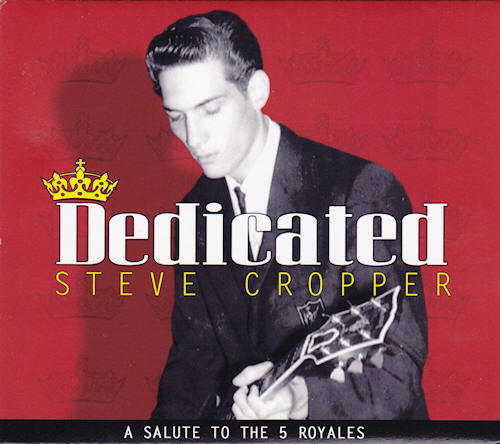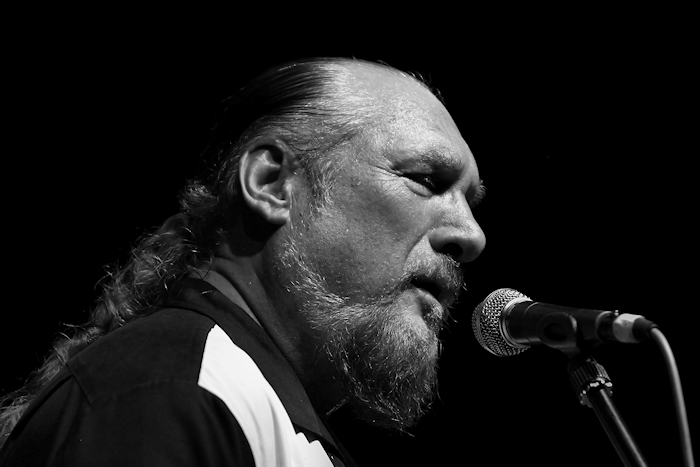
Painting © 2004 Loz
Arkle
Website
© Copyright 2000-2011 Alan White - All
Rights Reserved
Site optimised for Microsoft Internet Explorer
Early Blues Interview
|
||||
|
Long regarded as one of the finest studio guitarists in the music industry, and probably the best-known soul guitarist in the world, Steve Cropper has been most closely associated with the Stax Records label in Memphis, Tennessee, and was one of the pioneers in what has come to be regarded as "The Memphis Sound". First with the Mar-Keys, then as a founding member of Booker T. & the MG's. A major figure in the Southern soul movement of the '60s, Cropper made his mark not only as a player and arranger (most notably on classic sides by Otis Redding, Sam & Dave, and Wilson Pickett) but as a songwriter as well, co-writing such classics as "Green Onions", "In the Midnight Hour" “Knock On Wood”, “634-5789”, and the legendary (Sittin’ On) “The Dock of the Bay”, with friend Otis Redding. In the late 70’s Steve began his famous work as an original of the Blues Brothers Band, appearing in both major motion pictures and numerous TV shows. His music has been used in no less than 94 movies. Recently MOJO Magazine compiled a list of the top 100 Greatest Guitarists Of All Time with Steve Cropper being named number two, only Jimi Hendrix rated higher. In 1992 Steve was inducted into both the Rock and Roll Hall of Fame (as a member of 'Booker T. & the MG's) and then the Rhythm and Blues Hall of Fame. In 2004 Steve was a solo inductee into the Songwriter’s Hall of Fame, and received Tennessee’s Arts and Humanities Life Time Achievement Award. Booker T and the MG’s received the Governors Award in March 2005, saluting their contribution to the cultural life of Tennessee. Steve received a lifetime achievement Grammy Award in 2007. And in October of 2008, Booker T and the MG's were inducted into the Musician's Hall Of Fame. Luckily for us all ... the legend continues.
Sources: _________________________________________________________________________ I first met Steve in 2008 when Pete Barton (Animals & Friends) persuaded Steve to come over to the UK for a short tour, including the Great British R&B Festival in Colne, Lancashire (which is the gig where I took the above photo - as used on Steve's website). In 2011 Steve was back, again on tour with Animals & Friends, and again including the Great British R&B Festival, where I spent some time with Steve and was privileged to be granted an interview with the living legend ... Alan: What were your first musical memories growing up in Dora, Missouri and later in Memphis, Tennessee? Steve: We were brought up on a farm, very rural and I remember a little bit of radio there but when we moved from the farm, after my Dad got a job as a policeman in West Plains, Missouri, about 20 miles from the farm where we were brought up there were a lot of famous country people playing in the city so there was a lot of country music on the radio. But there was also this one station that played sort of off-the-wall kind of stuff like “How much is that doggie in the window” and “Tonight We Love..”. I’d be about 9 nine years old listening to that, and then I remember in 1949, when I was 8 years old, before we moved to Memphis, the touring Grand Ole Opry, came to West Plains, Missouri and two things happened that year; one was Tex River had that hit out, “Smoke, smoke, smoke that cigarette... smoke yourself to death...” and he had a movie and a tour and somehow he came to West Plains Missouri and I got Tex Rivers’ autograph. That was the highlight of my life! The Grand Ole Opry was probably the same year and it featured the Carters and they said, “We are going to feature our little star” and I think June Carter was about 13 years old, and she sang a solo and I’ll never forget it. Guys like Hank Snow and Rod Brasfield were on that show. So, with those two things I was exposed to people of prominence and stardom very young, but I don’t remember ever thinking, “Oh boy, I want to be like that”. Even after moving to Memphis and being around the place with Johnny Cash and Elvis Presley and Jerry Lee Lewis and Carl Perkins, I still really don’t remember ever having the feeling, “Man, I want do to do that”. Music to me was fun and it was business; we started a band but I didn’t want to play guitar. My uncle had a guitar which is fortunately now in my possession and I’m going to donate it to the new Musicians Hall of Fame Museum when it gets built in Nashville. The last one was cool and I had some stuff in there but they tore that down and a lot of their stuff got damaged in last year’s flood. They got Jimi Hendrix's guitar, which he played in the club in Nashville and they were able to acquire a lot of that stuff and re-build, in the museum, the stage and all that where Jimi Hendrix started, which I think is cool. I had a white guitar which I thought was great and I used to get my Uncle’s guitar out when I was real young. I used to ask permission, I didn't just do it on my own. My uncle didn’t play guitar, he played piano and fiddle, but he had it in case somebody came over after church on Sunday who played guitar and didn't have one. They'd play and sing gospel songs and some country. I loved the tone, was just fascinated by it. I never had any idea about playing, I’m still trying to play but I have fun with it. Maybe that’s what keeps me young because I never really accomplished the talent of playing guitar. I just learnt how to beat the crap out of it and have fun dancing with it. That's about it.
Alan: Did the rest of your family get involved in music? Steve: Not at all, my mum and dad played nothing. They loved music, I remember when I was young they would sing songs in the car and listen to the radio and I remember my mum’s favourite song was called Isle of Capri, and of course How Much is that Doggie in the Window. Then there was “Hey there, what’s that you got behind the green door...” I don’t have that record but I remember it as a kid on the radio.
Steve: The involvement came through a guy that they've just had a
special day at the Stax Museum, Charles "Packy" Axton. I’m almost
positive that we didn’t have any classes together at high school but he
came up to me one day in the hall and said, “I hear you’ve got a pretty
good band”. The band consisted of Charlie Freeman,
Alan: What was the name of the band? Steve: At that time the band was called The Royal Spades. We just loved to play poker all the time, we’d play for rocks, matchsticks, we didn’t gamble but we just loved playing. That name stayed with us for a long time until we had the record, Last Night and at Sun Studios they said, you can’t use that name on record because of the implications and the way people’s minds think. I remember we were up in the control room, we listened to the record again and I think Chips [Chips Moman, Sun Records producer] was going to go to Nashville the next day and master the record. I don't know why they didn't master that record, maybe they didn't have the equipment yet at Sun because they were just getting into having a [record mastering] lathe which Scotty Moore learned how to use, on which they mastered 'Green Onions', but this was like a year before so they were going up to Nashville to master the record. We had a meeting with the band about what we were going to call ourselves and somebody said, “Hey, we’re in Stax now with the marquee out front so why don’t we call ourselves The Marquees. I wasn’t too sure because of the way it’d look on a record and being a bit English and a bit French so I said, “Well what if we change the spelling. Since this is a keyboard record with Smoochy [Jerry Lee "Smoochy" Smith] playing the keyboard, what about the Mar-Keys” and everybody agreed and we went with it. Alan: How did the name Stax come about?
Alan: I visited the Stax Museum in Memphis a few years ago. Steve: I've just been talking to a lady today, after the show, who said we're planning to fly to America and arrange a bus trip with a group of people and we want to hit the different music cities, what would you suggest? I said "Whatever you do, go to Memphis, you can go to Graceland and see about Elvis, go to Sun Records and do all that, but whatever you do go to the Stax Museum". I suggested that if they are going to fly in to Chicago and pick up a bus trip in Chicago, see the Chicago Legends blues stuff, then go to Nashville and do all the Grand Old Opry stuff and all those tours, they have many of them, where Elvis and Chet Atkins recorded and do all that stuff, and then go on to Memphis. She said "We want to wind up in Texas" and I said "That's cool too, but if you want to keep the music going, go to New Orleans and have a big time, then go to Dallas, Texas". Dallas was a big music town as well but they were more into the commercial jingle business, which a lot of the guys I grew up working with, doing jingle packages for radio stations, worked at a company called Pepper-Tanner Sound Studios at that time [later becoming The William B. Tanner Company, or simply Tanner for short]. I probably worked on about five jingle packages with them, and a lot of those guys downsized in Memphis and they moved to Dallas because it was a big industry in Dallas, and they were shipping stuff all over the world. Alan: How did you first meet Booker T Jones? Steve: When I first met him I didn't know who he was and I looked at him and said “Hey, I know you. I saw you at the Club Handy playing bass" and he couldn’t have been more than 14 or 15 years old. He never validated if he did or didn’t do it because he was underage; we couldn’t get in because we were underage but we could see the band in the stairwell from the top of the steps through a big mirror. We were looking for a keyboard player and needed a regular guy; we’d already asked Robert Talley but he said he was working too much and couldn’t take a weekly job so Floyd Millen suggested we ask Booker T. He told me where he lived, not too far from Stax, so I went over there, knocked on the door and his mum answered and she sent me through to the den, and he’s sat there playing the guitar. I thought I’d gone to get a piano player but Booker is multi-talented and he can play anything, violin, horn, bass and his main instrument which most people don't know was trombone. He started on bass, then keyboards, organ and piano, played some guitar, and still does, but his instrument that got him through school and playing in a marching band was trombone; very accomplished at it. I only found out later the real reason why I was exposed to Booker T Jones was Floyd Newman and Floyd told me many years later, “Remember when I told you that there’s this young kid who can really play organ and keyboard? Do you know why I told you?" And I said "No" and he said "Because I was afraid of losing my baritone gig because Booker had come along and played a horn session.” He thought Booker was so good he would take his horn gig.
Alan: What does the MG stand for in Booker T and the MG's? Steve: Do you want my answer or Duck's answer? Duck’s answer says that it stands for 'Musical Geniuses'. I wouldn't say that but I can say that Duck said it! As the folklore has it we call ourselves the MGs because Chips Moman who was the studio engineer and A&R guy at Stax had an MG Triumph car. From the mid 50s on it was all about Cadillacs and Eldorados and Triumphs and the rest, and a group called the Triumphs had already had a hit with Burnt Biscuits so Duck says, “Let’s call ourselves the MGs”. Atlantic sends a letter over here to Britain to ask permission, not to promote the car but to use the name, and the letter that comes back from the lawyers says, “We don’t want to be involved with anybody doing music”, so we got a call from Atlantic telling us to change our name because you can't use "MG's". But we thought, no, we aren’t going to change that now, so we sat there one afternoon, Booker T, Lewie Steinberg, Al Jackson and myself, nearly crying it was painful, and somebody said, “Well what about Memphis Group? We can say it stands for Memphis Group and never say it stood for the car because we don’t want a law suit.” Alan: I know you were involved in all aspects of the Stax record company. What was the Stax formula for creating so many hit records? What was the magic there? Steve: Real simple, everybody involved from the writers to the musicians were there to make hit records to go on the Billboard charts and be played on the radio. That was what it was all about. Theoretically I’ve always looked at success is that if you are successful in what you do in most cases you will be compensated. So you don’t do things for money but if you do it well enough and good enough then money will come. It was a job and it was a fun thing to do. We worked just like a sports team and my theory has always been that one guy might win the game in the last seconds of a game but how did he get there, it took the whole team to get him to those final seconds. We operated as a team, worked as a team; we were a brotherhood and a family. When we went through those doors in the morning we were all part of the family. Wayne Jackson, our trumpet player, used to say, and I would say the same “You know Cropper, when we went to Stax to do a session it was like going to church. Outside stayed outside, you didn’t think about it and you were in there to work”. Under the most adverse conditions of no air conditioning in the summer time and not much heat in the winter time, but we didn’t care. We were making records and loved every moment of it.
Steve: I was in the Reserve Officers Training Corps from 9th to 12 grade, so 4 years of army training and I was captain of the rifle team for 3 years and from age 10 I was also captain of two platoons for Assembly and that sort of stuff. I did college for a year and a semester before we had Last Night in 1961 so left early and got demoted to Private. But you learn how to be very direct, how to project your voice so you’re not really shouting at anybody or belittling them but you are giving them instructions. We were on the road with Levon Helm in Japan and I really didn’t know I was that way until Tom Malone and the guys came in one day and said “Cropper, we have a gift for you”, and it was a t-shirt with epaulettes on, and they started nick-naming me the Colonel because I was always bossing people around. I didn’t mean to be bossy, it was my nature to do that. My kids today still can’t get over the fact that I talk in a loud voice sometimes and one day my daughter said, “Dad, you were born mad”, and I said, “I’m not mad, just because I talk in a loud voice and give directions”. When Dan Ackroyd asked everybody for our handles, the other guys said, “Cropper is the Colonel” but before that I had always been 'Sohc'. We had a private little deal whereby we’d use the Son Of and whatever your dad’s initial’s were, so I was Son Of Hollis Cropper. Tommy Dowd called me Sohc for ever and he thought it would be spelled 'Saucy'. That was my nickname at school, and then some of my buddies called me Dumbo because I had big sticky-out ears like the elephant.
Steve: The nucleus of the Blues Brothers Band came about after we had done two albums and two tours (The States and Japan) with that group of guys, the three horns, Donald "Duck" Dunn and myself, that's The Blues Brothers and with Levon's band we had Paul Butterfield, Mac Rebennack, and Willie Hall. Willie wound up in the movie but Steve Jordan and Paul Schaeffer weren’t allowed by contract. They called me in an emergency and they said, “The movie’s not going to happen because Jordan and Schaeffer can’t get out of their Saturday Night Live contract. I think we’ve already got somebody to take Schaeffer’s place, and that was Murphy Dunne, but we don’t have a drummer, do you have any suggestions”. I said, “Give me the phone” and I called Willie Hall so Willie wasn't on the Briefcase Full of Blues album, but he was in the movie. Alan: In 1996 Mojo Magazine named you "The greatest living blues guitar player". Which guitarist do you personally admire? Steve: I admire all of them but if I gave you a list I would leave so many people out. I admire the greatest of the greatest and you know who they are. I don’t try to copy, the world doesn’t need another Chuck Berry or another BB King, it’s already got them, although it’s fun to play their music. I have a new record out and one of my biggest influences was Bo Diddley, he literally made his guitar talk. It would be silly if I tried to do something like that but I still get sounds like that and love playing with Bo Diddley. So when you make reference to I Don’t Want it To Go Away, the Mojo magazine thing it’s nice to be respected but how do you live up to something like that. When guys say, “Oh they’ve put you second to Jimi Hendrix and he’s dead, that makes you number one”, I say “No it doesn’t. I’m just Steve Cropper and that’s what I do and I have fun doing it. I write songs and I play.” I’m honoured to even be on the list to start with and I just love those Mojo guys, they do a great job. The Rolling Stone list of top 100 guitar players put me right next to Bo Diddley and that made me think someone was listening to me, to be right next to my favourite guitar player in the world, Bo Diddley.
Alan: I believe that the Beatles planned to record with you but it never happened, why was this? Steve: It didn’t happen for a lot of different reasons but I’m not sure it ever would have happened. A friend of mine, who was a top DJ in Memphis at the time interviewed the Beatles when they were there and he came in one day and gave me a taped copy of his interview. On that copy he asked them about the possibility of them coming to Memphis to record something and John said something like, “Yeah we talked about that but we I don’t think we took it seriously” so they acknowledged they’d thought about it. Brian Epstein came over and spent a week in Memphis but then called afterwards and said they couldn’t come to Memphis because of security, even though we thought we had come up with a great solution for that. They could have walked down the street at Stax and nobody would have said anything, but they didn't know that. Then Brian said, “How would you feel about working with the boys and coming to New York and recording at Atlantic Studios?” I said, “Yes, I guess I could do that, even though it’s not Stax” so he said he’d get back to me. After about a month he called and said, “Steve, we're still talking about this, but they've been working on this album which is nearly finished so it’ll be the next project” and then a few weeks later the Revolver album came out and I’m thinking “Well they didn’t need ME on this. I’d have probably screwed up that whole record”. So I got to meet all of them and hang out with some of them. Mr Martin was just the nicest guy, a recording genius, and a mentor. Tommy Dowd [Atlantic Records] was my favourite sound engineer, he taught me not only how to mix but also how to judge, how to look at songs and how they are done. One night I was driving him back to his hotel and one night he told me to pull in at a liquor store and he went in for a pint of Scotch and he said that we needed some time, we were going to have a drink and he was going to talk to me about a few things. So we went into the hotel, he got some ice and he said, “Steve, I really admire what you do, I love the way you play, your production and all that, but I want to share some things with you, here’s what I want you to start doing as a songwriter. Every time you approach a song, I want you to put that hook right there”. All of a sudden I had three or four top ten records. It doesn’t work for everybody, but for me that secret worked and I had about 14 top tens and double repeats on a couple, Dock of the Day, Midnight Hour. Alan: Are there any particular songs that have special meaning to you?
Steve: I’m not sure I can name all of them without my notes but Stevie Winwood kicks it off, he overdubbed his vocal over here [in Britain]. A lot of the artists wanted to come down to the session and sing live, which was the way I like to play anyway. It only took two days and we cut all the tracks in two days and on the first day Bettye LaVette and Willie Jones did their duet and she did her song, we had Delbert McClinton to do Right Around the Corner (he only lives just around the corner) and he came in and just nailed it. Dylan Leblanc came up from Mussel Shoals, we had Buddy Miller come in. We had BB King on it and we’d recorded his track but we had to go to Las Vegas for the vocals. We had spoken to Shemekia and she was all up for doing it as she’d recorded with him before and he was a friend of her Dads so it was like a family reunion. Of all the recordings that one would stand out for me because BB sat on the couch with his guitar with Shemekia next to him and they were clowning around and I said, “Do you want to stay on the couch and play and sing? So we went and put a mike up on the coffee table and they sat there and sang and played and it sounds live on the record. I swear it does not sound overdubbed at all. He was so into it. That one stands out, as does John Popper, and Brian May, wow, I was not expecting that. And John Taylor the co-producer of the record knows Brian May really well and he kept saying, “Have you done the song yet” and Brian kept saying, “I’m going to get to it” so we wondered if we’d ever get a song or not, but he did. And then to have Dan Penn sing what is I think my favourite song of all time, Someone Made You For Me. We just had the lyrics out on the console and he saw them and said, “Who’s singing this?” and John said, “Well, nobody, we think we’ll just make an instrumental out of it” so he asked if he could take a shot at it. We were using Dan's studio but we hadn’t want to ask him to do a song as well. He said he’d do it tonight after we’d all gone and when he played us what he’d done the following day, it was just awesome. Alan: All the best for your current two-month tour of Britain and thank you very much for your time. Steve: It's a pleasure. _________________________________________________________________________
Check out Steve Cropper at the Great British Rhythm & Blues Festival 2011 Check out Steve Cropper at the Great British Rhythm & Blues Festival 2008
_________________________________________________________________________
Return to
Blues Interviews List |








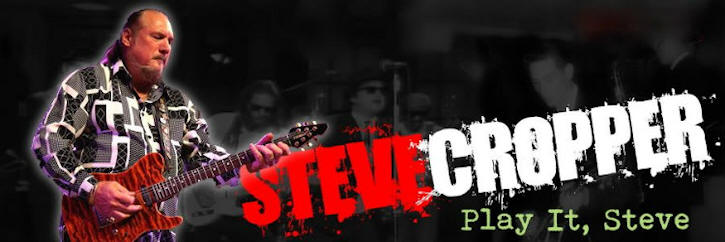

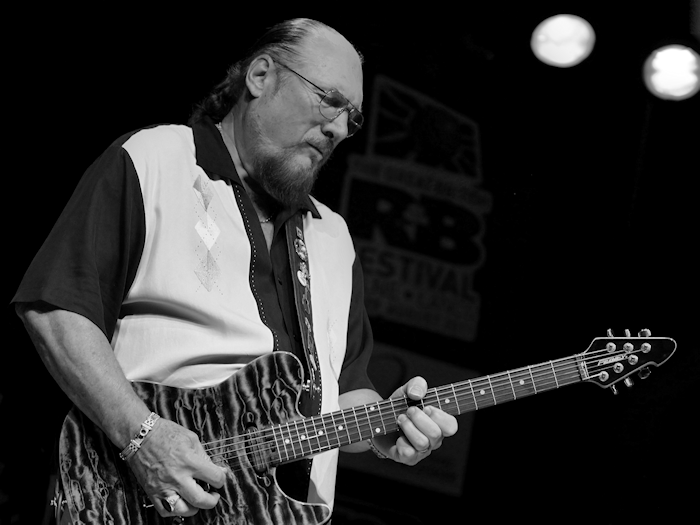
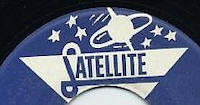 Alan:
How did you first get involved in Satellite Records that became Stax
Records?
Alan:
How did you first get involved in Satellite Records that became Stax
Records?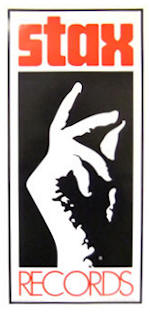 Donald
"Duck" Dunn, Terry Johnson on drums and myself. He said, “I’d like to
join your band, I play saxophone”. I said, “Well, we’re not looking for
any horns but how long have you been playing?”, and he said “I’ve been
taking lessons for 3 months”. I wish I could remember the detail but
somewhere in that conversation he said that his uncle had a recording
studio which was not really true because at that time he had some
recording equipment in his garage out in north Memphis. I told him to
turn up on Saturday for rehearsal and thought either nobody will like
this guy and it'll be over with, but if they like him, maybe I can go to
his uncle’s recording studio ( I didn't know it was just a garage at the
time). So he shows up and the other guys thought he was great. He
didn’t have his tone yet but he wasn’t squeaking, he'd learned pretty
good, and he had some natural talent there. So we said OK and he joined
us. In those days we just played for fun, not making any money. We were
about 15 years old at high school, we played church dances, at the
catholic youth organisation on Sundays and a methodist dance on
Fridays.
Donald
"Duck" Dunn, Terry Johnson on drums and myself. He said, “I’d like to
join your band, I play saxophone”. I said, “Well, we’re not looking for
any horns but how long have you been playing?”, and he said “I’ve been
taking lessons for 3 months”. I wish I could remember the detail but
somewhere in that conversation he said that his uncle had a recording
studio which was not really true because at that time he had some
recording equipment in his garage out in north Memphis. I told him to
turn up on Saturday for rehearsal and thought either nobody will like
this guy and it'll be over with, but if they like him, maybe I can go to
his uncle’s recording studio ( I didn't know it was just a garage at the
time). So he shows up and the other guys thought he was great. He
didn’t have his tone yet but he wasn’t squeaking, he'd learned pretty
good, and he had some natural talent there. So we said OK and he joined
us. In those days we just played for fun, not making any money. We were
about 15 years old at high school, we played church dances, at the
catholic youth organisation on Sundays and a methodist dance on
Fridays. 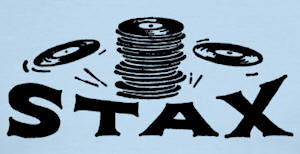 Steve:
Well that was a forced situation too because it started out as Satellite
Records, and I forget which song it was that made some national
popularity, something before 'Cause I Love You' (the first on
Stax - by Rufus & Carla Thomas) and 'Gee Whiz' (the second on
Stax - by Carla Thomas). All of sudden they got a letter in the mail
from a lawyer saying “You have to immediately stop using the name
Satellite because we already have it copyrighted.“ Miss Axton was in
the record business selling records and I worked in a record shop and
that's how I got connected with Stax Records in the studio with Jim
Stewart. We had never heard of a Satellite label, but somebody had it
copyrighted. I wasn't there but they sat up all night long to try and
come up with something that would work as a label and either Jim or
Estelle or one of the family came up with putting STewart and AXton
together for Jim Stewart and Estelle Axton, so the idea was obviously
“stacks” of records.
Steve:
Well that was a forced situation too because it started out as Satellite
Records, and I forget which song it was that made some national
popularity, something before 'Cause I Love You' (the first on
Stax - by Rufus & Carla Thomas) and 'Gee Whiz' (the second on
Stax - by Carla Thomas). All of sudden they got a letter in the mail
from a lawyer saying “You have to immediately stop using the name
Satellite because we already have it copyrighted.“ Miss Axton was in
the record business selling records and I worked in a record shop and
that's how I got connected with Stax Records in the studio with Jim
Stewart. We had never heard of a Satellite label, but somebody had it
copyrighted. I wasn't there but they sat up all night long to try and
come up with something that would work as a label and either Jim or
Estelle or one of the family came up with putting STewart and AXton
together for Jim Stewart and Estelle Axton, so the idea was obviously
“stacks” of records.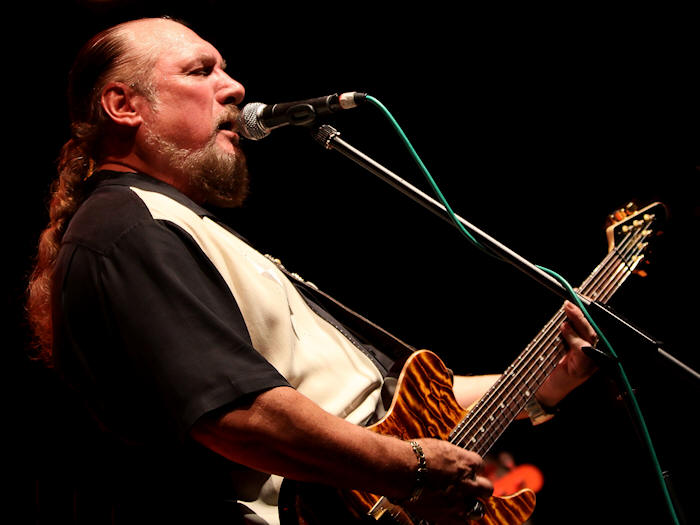
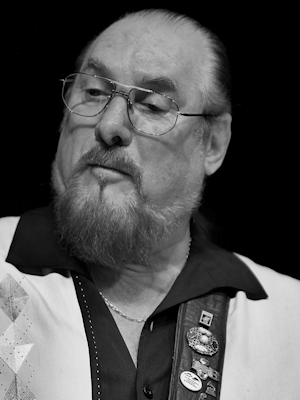 Alan:
How did you get the nickname 'The Colonel'?
Alan:
How did you get the nickname 'The Colonel'?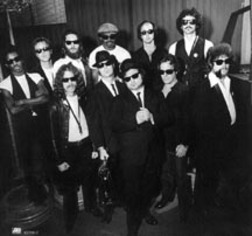 Alan:
Tell me about the Blues Brothers Band and how that came about?
Alan:
Tell me about the Blues Brothers Band and how that came about?
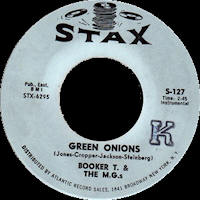 Steve:
Well, it’s like saying “What’s your favourite guitar” and I would say,
The one I’m playing now. I don’t have anything that I go back to and
listen to all the time. The best story to answer part of your question
is from Booker T Jones. We were playing a gig in New York and we were
checking the sound and a guy came up and asked us to play a bit of one
song so that they could check the balance. Booker said, Let’s just give
them Green Onions, so we played it the way we always play it -the
full live version - and we got through and Booker turned around at the
end of it and said, “You know guys, I’ll never get tired of playing that
song” and for me that says it all, and I said, “Yep, you're right, the
feeling’s mutual”. Whether I’m playing with Booker or somebody else I
enjoy the song – but I don’t enjoy it when the band that's playing it
thinks they know it and they don’t. It’s not an easy song, it’s not
what it appears to be, it’s about the organ part, not about the guitar
or the bass. It’s all about Booker’s organ part and his left hand is
walking up with the bass line and his right hand is going backwards. It
sounds like it’s forward but it’s not, it’s forward meeting backwards.
I didn't really understand that until I heard the horns in a big band
copying Booker's right hand, and it finally dawned on me that it's not a
forward movement, it's sort of backwards meets forward.
Steve:
Well, it’s like saying “What’s your favourite guitar” and I would say,
The one I’m playing now. I don’t have anything that I go back to and
listen to all the time. The best story to answer part of your question
is from Booker T Jones. We were playing a gig in New York and we were
checking the sound and a guy came up and asked us to play a bit of one
song so that they could check the balance. Booker said, Let’s just give
them Green Onions, so we played it the way we always play it -the
full live version - and we got through and Booker turned around at the
end of it and said, “You know guys, I’ll never get tired of playing that
song” and for me that says it all, and I said, “Yep, you're right, the
feeling’s mutual”. Whether I’m playing with Booker or somebody else I
enjoy the song – but I don’t enjoy it when the band that's playing it
thinks they know it and they don’t. It’s not an easy song, it’s not
what it appears to be, it’s about the organ part, not about the guitar
or the bass. It’s all about Booker’s organ part and his left hand is
walking up with the bass line and his right hand is going backwards. It
sounds like it’s forward but it’s not, it’s forward meeting backwards.
I didn't really understand that until I heard the horns in a big band
copying Booker's right hand, and it finally dawned on me that it's not a
forward movement, it's sort of backwards meets forward.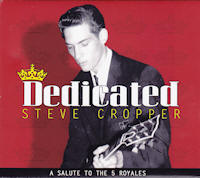 Alan:
Tell me about the album of your latest album 'Dedicated: A Salute
to the 5 Royales', I believe there's a host of guest artists.
Alan:
Tell me about the album of your latest album 'Dedicated: A Salute
to the 5 Royales', I believe there's a host of guest artists.